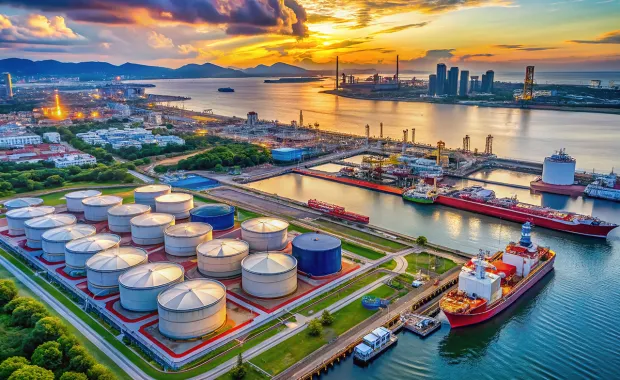- 1. Market opportunities for hydrogen in the next decade
-
Derek Marinos
Welcome to Energy Transition Talks. It's a space to explore the latest trends and innovations shaping the future of energy and utilities. I'm Derek Marinos, your host for today. Today's show is part two from last week's discussion about how ports are emerging as critical nodes for hydrogen production, import storage and distribution..
Of course, today, we're going to want to take a deeper dive into the markets and especially some of the business opportunities out there. We’ll also talk about sustainability, the environment and also regulation. My guests today are Dr. Magali Amiel from our last conversation and David van der Ploeg who's in the Netherlands. Welcome back, I’m happy to pick up the conversation.
David, I want to start with you. What are the biggest market opportunities you see for hydrogen in the next five to ten years and where might the industry face the greatest hurdles?
David van der Ploeg
Thank you, Derek, and happy to be back for this occurrence. Some of the biggest opportunities, as we highlighted last time as well, are in transporting renewable energy in the form of hydrogen. I see a lot of opportunity in intercontinental supply chains, moving renewable energy from one end of the earth to water.
On the other hand, I see a lot of potential in heavy industry, in long distance or heavy transport— basically the hard to electrify sectors that can benefit from hydrogen as a fuel or an energy source.
One of the biggest hurdles is in scaling all of this up and all the parties involved having to work together, whether it's locally, nationally or internationally. There are a lot of parties involved and big investments being made, but how does it all fit together and how do we integrate all of it so we can work together on this intercontinentally? That's one of the big challenges ahead of us.
- 2. Scaling green hydrogen: Sustainability, safety and investment insights
-
Derek Marinos
It clearly is. A question for both of you now (because you mentioned the word scale and I think it's important to address the sustainability and environmental impact here because once we do scale, you know, when it comes to production and transport there's going to be a tipping point there for sure). The carbon footprint will get a little bit bigger, and hydrogen still has been hailed as a sustainable energy solution but concerns about water usage, the land footprint and the life cycle emissions remain. How are these being addressed? First, I'll go to Magali.
Magali Amiel
That's quite a huge question. Yes, that's a challenging and huge because you the spread, you have different angles that you can start a question. But I think, right, all the investment that on infrastructure that we talked on the part on part one of the podcast, we really, you have to build infrastructure and big infrastructure. So you have an impact on that.
But in the end, the green hydrogen is really good for the decarbonization of the industry. So, we have to balance right about the impact of the infrastructure that we have to implement to have a sustainable supply chain of hydrogen and the resulting in the end. that's, that's quite a challenge. Another really important one is the investment, but then all the safety concerns.
We talk about ports, so in ports you have lot of activities, And hydrogen is highly flammable. So all the safety measures and all the security, the technology to secure the hydrogen on the space of the ports and across all the supply chain is also important.
Derek Marinos
David, your perspectives on this.
David van der Ploeg
Well from a sustainability or a low carbon perspective, definitely hydrogen has a big potential and has been hailed as a low carbon alternative to fossil fuels for example for quite some time. However we do need to be realistic about it I think, especially the green hydrogen options are really quite costly currently while other production methods may not be as sustainable, but still can be a much more sustainable alternative than currently being used fossil fuels, if we can eliminate those and replace them by hydrogen, then first of all, we need that to be affordable. Heavy investments are already being made to transition into hydrogen. If you then have green hydrogen, which is quite costly, that even adds to the investment. So to first of all make the investments for this transition, we need to also take into account the price of hydrogen.
For example, the United States is making big efforts to produce at a low cost rate. then sustainability is the question that will probably come after. Still, also to increase production volumes, keep track of supply and demand. Well, I think if we go just for the green production routes, we're going to run into a couple of challenges there. So we really need to diversify from a production perspective. Yes, keep sustainability in mind, but also get to scale up. We need to make sure that if these big investments into this transition are being made, these new facilities can start to be used even if it's with maybe non-green produced hydrogen at an affordable rate, then still we can make a big impact from a sustainability perspective. And once we really scale up in the long-term, the green hydrogen production, it will become more affordable and then we can make an even bigger impact. But to get there, I think we need to diversify, keep the options that we have in mind, keep in mind that the transition itself already is a large investment for many organizations and well do the best we can.
- 3. Transforming hydrogen production: Innovations for a greener supply chain
-
Derek Marinos
Yeah, and part of doing the best you can leads to innovation, obviously. And I think that's an important point to explore next and really take a look at what innovations are currently being explored to improve the sustainability and efficiency of hydrogen production and minimize its environmental impact. I this is going to be an imperative.
David van der Ploeg
Yeah, so there's a lot of innovation in this space currently happening if it comes to increasing efficiency of production methods. Of course, one production method may still be more sustainable than others, but also in the natural gas-based hydrogen production methods. For example, we're looking at carbon capture, carbon utilization, which can lower the total footprint of produced hydrogen. Of course, one of the big challenges in this space is if we can produce really low carbon hydrogen in one location, but we want to consume it somewhere totally different, we have to figure out a sustainable method of transport and a sustainable way of getting it to the point of consumption.
Derek Marinos
Magali, from a supply chain perspective, what kind of impacts are we seeing here?
Magali Amiel
It's really interesting the impact on the supply chain. So how David mentioned before, really, that will be the investment, the way that the investment on the infrastructure at ports or even for shipping lines or the transportation company involved on moving the hydrogen, what kind of assets they are going to build. And also it's important on this notion of green supply chain, right? Because behind hydrogen, it's the green supply chain. This is is how we are going to measure the effect. The data, how the stakeholder are going to share data to be sure they control, okay, what is happening and we have some, know, tangible results about we have a green supply chain in place. So that will start with all the monitoring about the infrastructure, the monitoring about the data, the hydrogen, you know, transportation and movement and also the commitment of the stakeholder on the framework on data standardization, data exchange, and measure the key PI on the green supply chain. Really, what is interesting with the hydrogen supply chain is we will cover all the parts from the production to delivery to the users. And that's the ecosystem working together to be more efficient and to have an impact to reduce the, you know, the global climate change.
-
Derek Marinos
Yeah. And that's an interesting point. You bring up a very key element there, data, because when it comes to environmental sustainability, I think if you can't measure it, you can't manage it. And data plays a key role here. And David, please explain what innovations are out there to help identify and quantify.
David van der Ploeg
On an organizational level, the last couple of years, we've seen many developments in terms of ESG-related reporting, non-financial reporting, and really quantifying the footprint of an organization. And in this case, we need to implement the same logic but on a supply chain level. So every organization involved in this supply chain will have an impact on the total footprint of the supply chain, starting from production all the way to the consumption point. We see innovations if it comes to actually measuring and tracking carbon emissions in every stage. We need to set that up as a supply chain point of view. We're seeing the first innovations there as well. Whereas also standards are currently being deployed that not only account for carbon emissions and total footprint in production stage or in the consumption stage, for example, but also attribute emissions if it comes to transport or to storage, the total supply chain being accounted for.
That leads back to what we previously discussed. If we can produce low carbon in one location, but consume somewhere totally different. Is it really the more sustainable option to ship renewable energies, to ship hydrogen across the world? Or can we produce locally, maybe at a bit of a higher footprint? But then have a far shorter supply chain produced local near to the point of consumption and will that be overall the more sustainable option? We need data integrations and innovations in this field to really keep track of the total impact of what we're trying to set up here and keep track of all factors involved, all parties involved for this total supply chain point of view.
- 5. Regulating hydrogen: Managing supply chain risks and lessons learned
-
Derek Marinos
Ultimately this is going to lead to regulation and government is going to need data and they're going to need the facts on the table to make decisions. And this leads us to our next segment here because we're looking at regulation, risk and government here. And I think it's important to identify a few elements here and Magali, I'd like to begin with you. I mean, how are companies managing the risks associated with hydrogen supply chain disruptions? And are there lessons that can be drawn from other industries? You alluded To it a bit in our previous discussion, but I wanted you to kind of explore that in more detail here in part two.
Magali Amiel
Yeah, for managing the risk, it's really on the DNA of supply chain, right? Well, first to managing the risk, it's the diversification of supplier. Of course, when you are working on supply chain and when you are users, you are going to say, OK, what are my options B, C and D. So diversification of suppliers and to the point to David, local versus international or global suppliers. That's why that could be important to track the data to measure the competitiveness of the supply chain. But in terms of risk also, it's all around the security. For hydrogen, it's like what we have seen for crude oil and petroleum, you know, for that sky the same, you have to implement what they call comprehensive risk management framework. And we know that currently you have some stakeholders of supply chain, including suppliers, government, industry groups, insurance working on this comprehensive risk management framework to give guidelines to the industry and to also to align the regulations between the different geography and the different level of government.
- 6. Advancing hydrogen: The crucial role of government regulation and support
-
Derek Marinos
Now, David and Magali, obviously government has a key role to play here. know, and we're trying to look at what role do government policies and regulations play in advancing hydrogen adoption and decarbonization and what further policy support is needed. I mean, ultimately, the private sector and industry is going to play a key role here. David, I'll start with you.
David van der Ploeg
Yeah, I think governments have a big role to play in all of this. First of all, terms of bringing new regulation that either sets a clear playing field or really boosts this supply chain to move forward. And we see many of those regulations arising already.
In various regions of the world, we see tax benefits for low carbon hydrogen production for example. In the United States as mentioned there's a large focus on low-cost production. I think the goal is to produce it at one dollar per kilogram. All to promote new methods and extending existing methods of production.
Of course, in Europe, a sustainability perspective, with Europe's renewable energy directive, similar revolvements and similar boosts to industry are being deployed. On the other hand, think governments also have a role to play if it comes to standardization. So we see many standards arising, for example, which may differ amongst each other. And I think it's a role for governments to sort of set the level playing field, come up with the rules of engagements in this sense and set the standardization of what do we track if it comes to carbon intensity? How do we work together internationally or intercontinentally? I think in that sense, standardization, setting up the connection and working together on a bigger scale, there's also a role to play for governments.
Derek Marinos
And Magali, from your perspective.
Magali Amiel
I agree with David. I think government is really important and the standardization. What we are seeing is when you have too many standards in the end, you don't follow one at all. So all around standardization is really important. And also around, know, you have like the IEMO organization, the International Maritime Organization, for example, or all the different must be involved with the government and with the industry because in the end we have to see the alignment between industry, government and international organization to have one or two clear standards that will help both for the production, the storage and the use of the hydrogen supply chain.
- 7. Hydrogen vs. electrification: Finding balance in a sustainable economy
-
Derek Marinos
Of course, it's such a volatile energy source without standardization, one would suspect it just can't get off the ground. Let's transition now a bit to and I want to get a little clairvoyant if I may use the term and look down the road. You know, what does the future look like for hydrogen in the context of an increasingly electrified and decarbonized global economy? David, I'll start with you.
David van der Ploeg
I think we have to look at our options depending on the problem we're trying to tackle. So electrification in many applications is probably the way to go. it comes to heating homes at scale, electrification has many opportunities. If it comes to personal transport and if you look at the rate that we can currently charge car batteries for example, there's massive opportunity there. I think it's especially hard to electrify industries in heavy transport, long distance transport, where batteries are not really a feasible option or at least not currently. That's where hydrogen has its potential, as well as we've mentioned in international and intercontinental transport of renewable energy from places in the world where we can produce low carbon energy or renewable energy to places where we want to consume this renewable energy.
Derek Marinos
Magali, if you had to identify one make or break factor that will determine hydrogen success, what would it be?
Magali Amiel
One make or break. Well, I think it's really for me, it's the alignment between the business needs, the governmental objectives, because what we are seeing in the other, for example, electrical, electricity all around the electric vehicle and things like that, we really push and especially in Quebec and Canada, we push around electric. But as David mentioned before, yes, it's good for one part of the transportation industry, but not for shipping, for example, or not yet. So really, the make or break factor is really high. You have a consensus of the key players working together and having the same goals to develop and empower the use of the hydrogen on the industry.
- 8. Next steps for hydrogen: Monitoring milestones in global collaboration
-
Derek Marinos
Collaboration; that's key. Finally I'm going to ask both of you an interesting question—I'm going to see if I can get two from both of you. What are the next milestones we should be watching for in hydrogen's journey to becoming a mainstream energy source? Magali, I'll give you the first shot at this one.
Magali Amiel
Cool, two. So for me, that's a key milestone. Yes. The key milestone that maybe the results of the, for example, really tangible milestone, the agreement between Canada and Germany on the hydrogen supply chain corridor, you know, the next step, what will be in six, eight months, twelve months from here, from now, sorry, and seeing some results. That's first.
Second, is really an international commitment for port authority on how we can implement hydrogen facilities and hydrogen infrastructure into ports territory to be sure that we don't have ports that were allowed to develop hydrogen and ports that can't develop because of lack of standardization of the policy for the support from government industry to the port.
Derek Marinos
So, bilateral agreements and standardization. And for you, David?
David van der Ploeg
I'm keeping a close eye on the developments around Europe's international hydrogen pipeline system being currently set up and built. I think for the European perspective that will really be a big step towards an international supply chain and international pipeline of transportation which will benefit the local hydrogen hubs that we've discussed previously that will benefit import and export possibilities and that will be a big enabler for hydrogen in Europe.
And secondly, I'm keeping a close eye on production cost of hydrogen and basically pricing for the consumer. Currently depending on production method, but especially if we talk about green hydrogen, prices are really quite high. with, for example, the US really focusing on low cost of production, I think that will be a massive benefit to further implementing hydrogen across the world. If it becomes more of an affordable option, I think we will see many more applications.
Derek Marinos
Interesting. Magali Amiel and David van der Ploeg, thank you very much for sharing your insights today on hydrogen and the critical role that the port authorities are going to play in its development and ultimately its use here on the planet to possibly help with decarbonization. I'm Derek Marinos. Thank you very much for listening to the latest installment of Energy Transition Talks, a podcast dedicated to the energy space.









